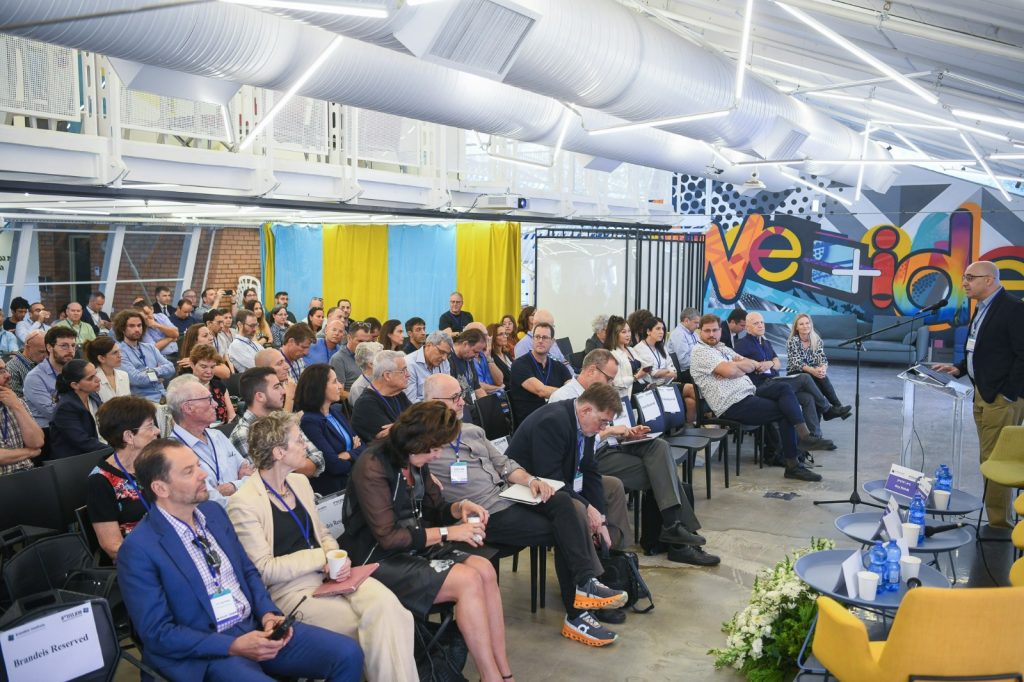The Brandeis Institute launched its activities by holding an international conference on “Competition, Centralization and Democracy”. The conference, which was held at the College of Management in Rishon le Zion on June 1, 2023, was attended by senior academics from leading academic institutions in Israel and around the world. The conference contents are available below.
1
Greetings
We are excited to launch the Brandeis Institute activities, presented by the Institute’s academic director, Dr. Ido Baum, the dean of the Strix Faculty of Law at the College of Management, Dr. Ruthy Lowenstein Lazar, and the dean of the School of Economics at the College of Management, Prof. Gady Jacoby.
2
Freedom and Concentrated Ownership of the Media
The opening keynote lecture of the conference was delivered by the renowned economist Prof. Luigi Zingales from the University of Chicago.
Prof. Zingales discussed the interplay between media ownership and democracy. He highlighted the potential risks that could arise from the close relationship between capitalists who own the media and the government’s ability to regulate it.
3
Democracy, the Rule of Law, and Economy
Prof. Anat Admati from Stanford University is a member of the Brandeis Institute’s academic advisory board.
In her keynote lecture, Prof. Admati emphasized the importance of preserving the independence of democratic institutions and their connection to the strength and sustainable growth of the economy.
4
The Role of Competition in Democracy: from Brandeis to Chicago and back
Louis Brandeis viewed economic concentration of power as a threat to democracy in the US. His approach influenced the design of the US competition law at the beginning of the 20th century, but was later replaced by the classic “Chicago School”. In recent years, there has been a shift in the US with the emergence of a new school of thought that challenges the appliance of the existing competition law, and is sometimes reffered to as the “New Brandeis” movement.
The panel discussed the characteristics of the changes in the US, their implications, and what can be inferred from them regarding the situation in Israel.
Panel participants: Prof. Luigi Zingales, economist and head of the Stigler Center from the University of Chicago; Prof. Ariel Ezrachi, expert in competition law from the University of Oxford; Prof. Roy Shapira, expert in corporate law from Reichman University; Prof. Jesse Fried, expert in corporate law from Harvard University and a member of the Brandeis Institute’s academic advisory board; Prof. William Kovacic, expert in competition law from George Washington University and former head of the Federal Trade Commission; Dr. Cristina Caffara, economist and competition expert.
Panel moderator: Guy Rolnik, University of Chicago and TheMarker.
5
The Israeli Perspective: Competition, Centralization, Cost of Living
In recent years, and despite the 2013 legislation that marked Israel as a pioneer in addressing the issue of centralization, Israel has been suffering from an ever-increasing cost of living problem, particularly in light of the growing power of monopolies and economy-wide centralization.
A few days after the state budget for 2023 and 2024 was approved, a panel of senior officials from the field of economic regulation was asked to identify the reasons for the high cost of living and how the government is addressing this challenge.
Panel participants: Inon Elroy, head of the industry department at the Ministry of Economy; Kfir Battat, deputy head of the budget department in the Ministry of Treasury; Adv. Yael Schanin, Legal Advisor and Director of the Legal Department at the Competition Authority; Adv. Didi Lachman Messer, former Deputy Attorney General (Economic-Fiscal affairs) and member of the Brandeis Institute’s academic advisory board.
Panel moderator: Liel Kyser, the financial reporter of the public broadcasting corporation “Kan”.
6
Democracy, Autocracy, Economy
The Brandeis inaugural international conference took place In June 2023, during a wave of protests and legislative changes that threatened to weaken Israel’s democratic character and judicial system. Given these circumstances, the Brandeis Institute established a joint expert team with legal and economic academics from Poland and Hungary, designed to learn from the experiences of these countries regarding the long-term consequences of democratic retreat.
The panel of experts shared their insights on the economic impact of democratic withdrawal in their home countries and what lessons can be learned from them in the context of Israel.
Panel participants: Prof. Zoltan Pogatsa, Department of Economics, University of Western Hungary; Dr. Jaroslaw Beldowski, President of the Polish Association for Law and Economics, Warsaw School of Economics; Prof. Andrzej Rzonca, Faculty of Economics, Warsaw School of Economics; Prof. Iris Canor, European law expert from the Zefat College and the College of Administration.
A summary view was presented by Prof. Yishai Yaffe, former dean of the School of Business Administration, Hebrew University and member of the Brandeis Institute’s academic advisory board.
Panel moderator: Dr. Ido Baum, the academic director of the Brandeis Institute.
7
Israel 2024 - Forecast
The panel aimed to investigate whether the legislative initiatives of the coalition in the Israeli government to weaken the judicial system and change the structure of the regime in Israel are undermining democracy and what their impact will be on institutions that are essential to the existence of the democratic state, its security, and its future, such as the army, the media, and scientific research.
Panel participants: Dr. Natalie Davidson, Faculty of Law in Tel Aviv University; Major General (res.) Dan Efroni, former Chancellor and member of the Brandeis Institute’s academic advisory board; Guy Rolnik, founder of TheMarker; Prof. Avi Zadok, Department of Engineering at Bar Ilan University and member of the National Council for Research and Development; Adv. Linor Deutsch, founder and CEO of Lobby 99.
Panel moderator: Dr. Ido Baum, academic director of the Brandeis Institute.

